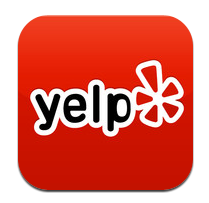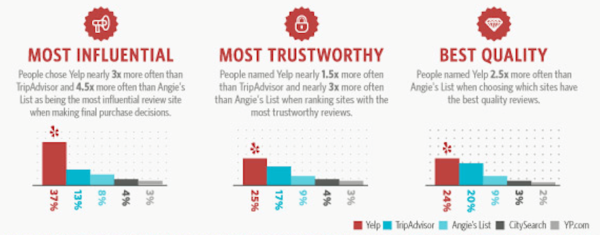Survey Says Yelp The Most Influential Local Review Site
Yelp says it’s the most frequently used, most trusted and highest quality local reviews site, according to new Nielsen survey data. Some of those data were released on the company’s official blog two days ago. Beyond Yelp, the universe of competitors included in the survey were the following: Angie’s List Citysearch OpenTable TripAdvisor YP Zagat […]

Beyond Yelp, the universe of competitors included in the survey were the following:
- Angie’s List
- Citysearch
- OpenTable
- TripAdvisor
- YP
- Zagat
The survey was commissioned by Yelp and conducted by Nielsen using a sample of just over 1,000 US users of review sites. The survey featured 22 questions in all. Only a few of the results were released. The sample was weighted for age and gender so that it was representative of Nielsen’s NetView audience profile data on user review site visitors.
As a threshold matter, the survey found that 78 percent of consumers use review sites to find local businesses and help make purchase decisions. The exposed data then compare how Yelp ranks vs. others against several criteria: “most influential,” “most trustworthy” and “best quality reviews.” Yelp wins in each category.
I originally wrote about the survey results on my personal blog Screenwerk and immediately began to hear skeptical reactions. For example, questions such as: “Why weren’t Google and Facebook included”? I asked Yelp about this and several other issues.
Here’s what Yelp said about Google and Facebook specifically:
Our findings specifically around review sites came after we included Google and Facebook in a question on what sites people use to find local businesses, but those sites aren’t solely focused on local business discovery. We dug deeper into those sites that are.
My suspicion, based on preexisting survey data, is that Google and Facebook broadly exceeded Yelp as a source for local business information. As a technical matter it can be argued, as Yelp does, that Google and Facebook can be excluded because they offer broader use cases than “local business discovery.”
It’s also true however that including such findings would diminish the story that Yelp is trying to tell here.
Among the 1,000 respondents were 668 Yelp users. This was another source of skepticism for some, who asserted that the survey sample must be biased. Yelp told me in email that respondents weren’t screened (other than for usage of review sites) before the survey was conducted:
For this survey, we asked for 1000+ users of review sites but didn’t care which ones they used. They later self-identified that they had or do use Yelp, merely showing our dominance in the market. It wouldn’t make sense to exclude Yelp users from the survey.
There’s no question that Yelp is influential in local purchase decisions, and it may well be more influential than its immediate rivals in many categories — though it’s very hard to imagine Yelp beating TripAdvisor in the travel/hotels category.
Regardless, it’s difficult to fully evaluate the claims and merits of this survey without a look at the questions and full results.
Contributing authors are invited to create content for Search Engine Land and are chosen for their expertise and contribution to the search community. Our contributors work under the oversight of the editorial staff and contributions are checked for quality and relevance to our readers. The opinions they express are their own.
Related stories
